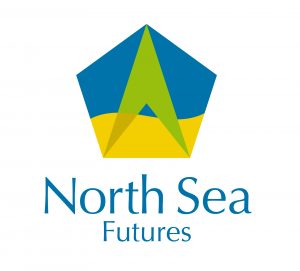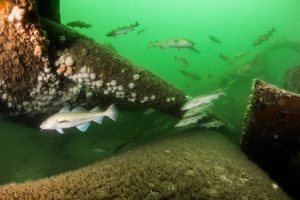 North Sea Futures was founded in 2017 by Anne-Mette Jørgensen (Director) and Michael Brinch-Pedersen as an independent, not-for-profit company and network organisation.
North Sea Futures was founded in 2017 by Anne-Mette Jørgensen (Director) and Michael Brinch-Pedersen as an independent, not-for-profit company and network organisation.
We envisioned a future resilient North Sea, based on more intelligent design and management of offshore structures and smarter funding mechanisms for ecosystem restoration and sustainable use of its resources.
We wanted to contribute to the realization of this vision by
- Stimulating and contributing to a well-informed debate on the potential nature and environmental benefits that could be achieved by taking a more flexible approach to the management, reuse and decommissioning of offshore structures;
- Inspiring innovation in the offshore energy sector that helps to make the best possible use of natural resources in line with the principles of a circular economy and maximizes ecosystem services provided by offshore structures;
- Developing and demonstrating a next best practise in decommissioning (and general management) of offshore energy installations that maximizes ecosystem and wider societal benefits;
- Establishing an independent fund or other organisational structure to ensure that a more flexible approach to decommissioning of offshore structures would generate maximum benefits for the environment and society in general.
North Sea Futures received funding from the Velux Foundations and performed a range of activities in 2017 and 2018.
In 2017
- We commissioned NIRAS to write a report examining current practises and future potentials for A Circular Economy and Ecosystem Service approach to offshore wind power installations.
- We organized an International Science – Green NGO Dialogue Meeting on Management and Decommissioning of Offshore Installations with the title “Blue Growth and Ecosystem Resilience in the North Sea: Sustainability Challenges and Opportunities”. As preparation for the dialogue meeting, we published a Discussion paper and Background briefs on Blue Growth and the Energy Transition: Unprecedented Industrialisation of the North Sea, Technical Decommissioning options for offshore installations and the Current Regulatory Framework.
- The dialogue meeting led to the publication of the North Sea Futures Manifest, providing a heads-up for decision makers, scientists and civil society organisations to (re-)consider and discuss how to achieve the most environmentally beneficial results from future offshore installation and decommissioning activities. The manifest presented 10 Principles for making the North Sea thrive as an ecosystem during transition from fossil to renewable energy production.
- Based on literature and previous work, Anne-Mette Jørgensen wrote a status report on the Environmental Impacts of the Decommissioning of Offshore Installations in the North Sea. This reports provides an overview of what we know and don’t know about the environmental impacts of decommissioning of offshore installations in the North Sea, dealing with oil and gas installations as well as wind farms.
In 2018, the work of North Sea Futures focused on communicating our learnings and influencing the political debate within the EU (during the Danish chairing) and OSPAR.
- Based on an expert suvery organised by North Sea Futures, a large group of scientists jointly published the article A.M. Fowler, Jørgensen, A.M et al (2018). “Environmental benefits of leaving offshore infrastructure in the ocean”. Frontiers in Ecology and the Environment.: https://esajournals.onlinelibrary.wiley.com/doi/full/10.1002/fee.1827#.Wzu_vehPGgE.linkedin This article led to a substantion amount of media attention. See below for a full list.
- Ingeniøren, kronik A.M. Jørgensen: “Milliard-oprydning på havet gavner ikke havmiljøet” https://ing.dk/artikel/kronik-milliard-oprydning-paa-havet-gavner-ikke-havmiljoeet-213046
- Mid-March 2018, the Meeting of the Offshore Industry Committee (OIC), held under the auspices of the Oslo Paris Convention (OSPAR), performed their five-yearly review of the derogation rules related to the Disposal of Disused Offshore Installations (OSPAR Decision 98/3). This meeting concluded, once again, that there is no need for any substantial adaptations of the regulations for decommissioning of offshore installations. North Sea Futures found it incomprehensible that the OIC review did not in any way consider the growing body of scientific evidence on the ecological value of offshore installations and therefore called for the Ministers of the OSPAR countries to support
- A thorough review of OSPAR Decision 98/3 and related regulations, with a focus on how to ensure that the best environmental option for decommissioning is chosen, independent of the current derogation criteria.
- An assessment of what implications the current decommissioning regime will have on offshore wind farms and for the feasibility of ‘nature-inclusive design’ of wind farms; and
- The development and implementation of pilot projects that focus on the repurposing of offshore installations, including wind farms, with the aim of restoring specific habitats or supporting the conservation of vulnerable and threatened species.
- You can read the full letter here.
- During 2018 and 2019, Anne-Mette Jørgensen has been giving various presentations based on the work of North Sea Futures and co-authored a second scientific publication: Fowler, A. M., Jørgensen, A.-M., Coolen, J. W. P., Jones, D. O. B., Svendsen, J. C., Brabant, R., Rumes, B., Degraer, S. “The ecology of infrastructure decommissioning in the North Sea: what we need to know and how to achieve it”
Media attention following North Sea Futures-related publications:
- BBC. “Call to turn oil rigs into nature reserves” https://www.bbc.com/news/science-environment-44726346
- BBC Wildlife. “North Sea oil rigs can make a valuable contribution to the ecosystem” https://www.pressreader.com/uk/bbc-wildlife-magazine/20180829/281621011178707
- Eurekalert. “Oil rigs may end their days as valuable artificial reefs” https://www.eurekalert.org/pub_releases/2018-07/au-orm070918.php#.W0N_8vAJQtk.linkedin
- Construction21. “Former oil rigs could have environmental benefits, says poll” https://www.construction21.org/articles/h/former-oil-rigs-could-have-environmental-benefits-says-poll.html
- Researchcareer. “Old sea builds seen as new sites” http://www.researchcareer.com.au/news/old-sea-builds-seen-as-new-sites#.Wzub4fIzCws.linkedin
- Maritime Executive. “Decommissioning: Platform Removal Needs Rethink” https://www.maritime-executive.com/article/decommissioning-platform-removal-needs-rethink#gs.sd4fuJ8
- NOS. “Milieu-experts: laat delen Noordzee-platforms staan voor biodiversiteit” https://nos.nl/artikel/2243279-milieu-experts-laat-delen-noordzee-platforms-staan-voor-biodiversiteit.html
- World Fishing Net. “Mandatory offshore rig removal needs a rethink, environmental experts say” http://www.worldfishing.net/news101/industry-news/mandatory-offshore-rig-removal-needs-a-rethink,-environmental-experts-say
- Offshore Technology. “Marine wildlife benefit from decommissioned oil rigs left in ocean” https://www.offshore-technology.com/news/wildlife-decommissioned-oil-rigs/
- Energy Voice. “North Sea decommissioning rules need a re-think, academics say” https://www.energyvoice.com/oilandgas/north-sea/176162/north-sea-decommissioning-rules-need-a-re-think-academics-say/
- Science Daily. “Oil rigs may end their days as valuable artificial reefs” https://www.sciencedaily.com/releases/2018/07/180709104605.htm
- Jyllandsposten. “Gamle boreplatforme laver kunstige rev i Nordsøen” https://jyllands-posten.dk/nyviden/ECE10746612/gamle-boreplatforme-laver-kunstige-rev-i-nordsoeen/
- JSTOR Daily. “Can Oil Rigs Grow into Ocean Reefs?” https://daily.jstor.org/can-oil-rigs-grow-into-ocean-reefs/
- CBS News. “From rigs to reefs: Researchers encourage authorities to rethink oil rig removal” https://www.cbsnews.com/news/from-rigs-to-reefs-researchers-encourage-authorities-to-rethink-oil-rig-removal/
- YaleEnvironment360. “As North Sea Oil Wanes, Removing Abandoned Rigs Stirs Controversy“ https://e360.yale.edu/features/as-north-sea-oil-wanes-removing-abandoned-rigs-stirs-controversy

